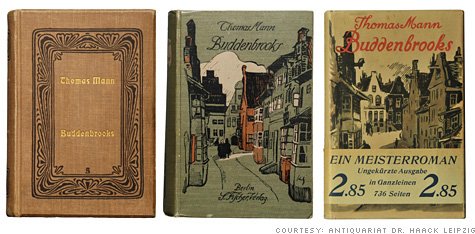
美國出版商已出版大量商管書,但談論經營家族事業的書籍卻沒有一本比得上德國大文豪托瑪斯曼(Thomas Mann)的《布頓柏魯克世家》(Buddenbrooks)。
現代行銷人員可能會以「磅礡的跨世代長篇小說」形容這部問世已有108年的作品,這本小說虛構一個在十九世紀居住於波羅的海呂北克港的穀商家族,並紀錄該家族40年的興衰。
《布頓柏魯克世家》並非唯一描寫企業興衰的文學作品。羅斯(Philip Roth)的《美國牧歌》(American Pastoral)描述戰後美國手套事業的起落,麥爾維爾(Herman Melville)《白鯨記》(Moby Dick) 也陳述捕鯨事業的甘苦。
德萊瑟(Theodore Dreiser)的《金融家》(The Financier) 和《巨人》(The Titan)則巧妙描述商人在充滿機會之地的機遇;奈波爾(V.S. Naipaul)的《大河灣》(A Bend in the River)更深刻描寫急劇的變革、動盪的政權,帶來的是一群群飢民,以及形形色色、尋找發財機會的非洲人。這些書對老闆來說都是很棒的讀物。
但《布頓柏魯克世家》特別引人入勝之處在於,作者托馬斯曼深刻了解要一代接一代地傳承家族企業有多難,因為這位1929年諾貝爾文學獎得主自己就是在呂北克港的家族企業長大成人的。
《布頓柏魯克世家》縱跨布頓柏魯克家族四代,充滿各種深刻描繪的人物關係,而他們須處理的家族議題,和現在美國家族事業面臨的問題如出一轍,例如接班議題、婚姻及經營焦點等。
布頓柏魯克家族顯示,光靠後代子嗣維持家族企業營運是不夠的,因為下一代子女的經營企業技能總是不如上一代,彷若創業動機和進取心會隨家族血緣擴大而遭稀釋。家族企業總是面臨婚姻問題。布頓柏魯克家族的子女就像許多企業第二代,身邊總圍繞著盼望嫁入豪門或少奮鬥20年的異性。書中人物東妮就為了維持家族生存,嫁給一個外表看來年輕有為的企業家,但他其實是個騙子。
書中最扣人心弦、最具悲劇性的人物當屬靈魂人物托瑪斯,他被迫扮演穩重的商人角色,個性卻與這個角色格格不入;他甚至在扮演好這個角色、避免家族成員瓜分家產等多重壓力的拉扯下,提前衰老。
托瑪斯也把大多精力浪費在公共事務,到後來他出席各類公共場合的重要性甚至超越了擴張事業。這個教訓很清楚:如果你要經營事業,就專注在事業上。
書中最震撼人心之處或許是家族事業對家族成員的壓制:東妮犧牲了婚姻,大家長托瑪斯更發現自己只是家族事業人質,為了供應家族成員吃穿而活著。《布頓柏魯克世家》是部警世作品,道出為何多數家族事業無法逃脫「富不過三代」這句諺語。
(取材自CNN Money網站)
【編譯/簡國帆2010/09/06 經濟日報】
A dead German novelist's cutting-edge business advice
By Daniel AkstDecember 15, 2009: 10:01 AM ET
(Fortune Small Business) -- America's publishers churn out new business books by the boatload, but none of them has as much to say about running a family business as a single novel published in Germany 108 years ago.
Thomas Mann's Buddenbrooks is the kind of work that modern marketers would label "a sprawling multigenerational saga." But in Mann's case, it's not hyperbole. Buddenbrooks chronicles, with profound insight, the four-decade rise and fall of a fictional 19th-century family of grain merchants in the Baltic seaport of Lübeck.
Buddenbrooks isn't the only literary work that shines a light on the vicissitudes of entrepreneurial life. Philip Roth's American Pastoral does for the postwar glove business what Moby Dick did for whaling. The Financier and The Titan, both by Theodore Dreiser, are subtle accounts of a businessman's adventures in a land of opportunity. V.S. Naipaul's A Bend in the River is the best description I've read of life as a vulnerable member of an entrepreneurial minority group. All these books are great reading for any business owner.
What makes Buddenbrooks particularly interesting is its author's deep understanding of how hard it is to keep a family enterprise going generation after generation. Mann (who won the Nobel Prize for Literature in 1929, mainly for this book) had firsthand knowledge of his subject: He grew up in Lübeck, in just such a family. The book spans four generations of Buddenbrooks, along with a host of sharply drawn relations, and the family members deal with the same kind of problems that bedevil family businesses in 21st-century America.
Succession Planning: The Buddenbrook clan and its fate demonstrate the inadequacy of heredity as a technique for sustaining a family enterprise, for each new scion proves less adept at business than the previous one. (The final generation, embodied by young Hanno Buddenbrook, isn't fit for much of anything except spending long, enraptured hours at the piano.) It's as if the drive and enterprise that launched the business are diluted every time a chief executive reproduces.
Marriage: Then there's the problem of matrimony. Like many wealthy scions, the Buddenbrook offspring are beset by gold diggers. Poor Tony Buddenbrook is pressured by her family (bent on sustaining the business via the altar) into marrying a seemingly pious entrepreneur who proves to be a con man. Her second marriage is little better. Her hapless brother Christian marries a woman of ill repute who quickly has him committed to a mental institution, and Tony's daughter gets hitched to a future felon.
The most compelling -- and tragic -- figure is Thomas Buddenbrook, who runs the business through much of the book. Thomas is a decent businessman, for the most part, but it's a role he's adopted and one for which he never seems fully suited. He ages prematurely under the strain of maintaining that role -- and keeping family members from dissipating assets, making bad marriages or dishonoring the Buddenbrook name.
Focus: Thomas squanders his own energies in public affairs, getting elected senator only to find himself enmeshed in endless meetings and hindered by his growing vanity. His life becomes increasingly about keeping up appearances rather than expanding the family enterprise. The lesson is clear: If you're going to run a business, focus on that business, because it's not going to run itself.
Perhaps most striking is the extent to which the business exercises a kind of tyranny over the lives of family members. Tony sacrifices her happiness. But even Thomas, who comes to embody the firm and the name it carries, finds himself held hostage to it, perhaps even more so than the family members who merely depend on its earnings.
Buddenbrooks is a cautionary tale, easy to read despite its bulk. It powerfully illustrates the joys and pitfalls of running a family business -- and the reasons why most family firms don't last beyond a single generation.



 留言列表
留言列表